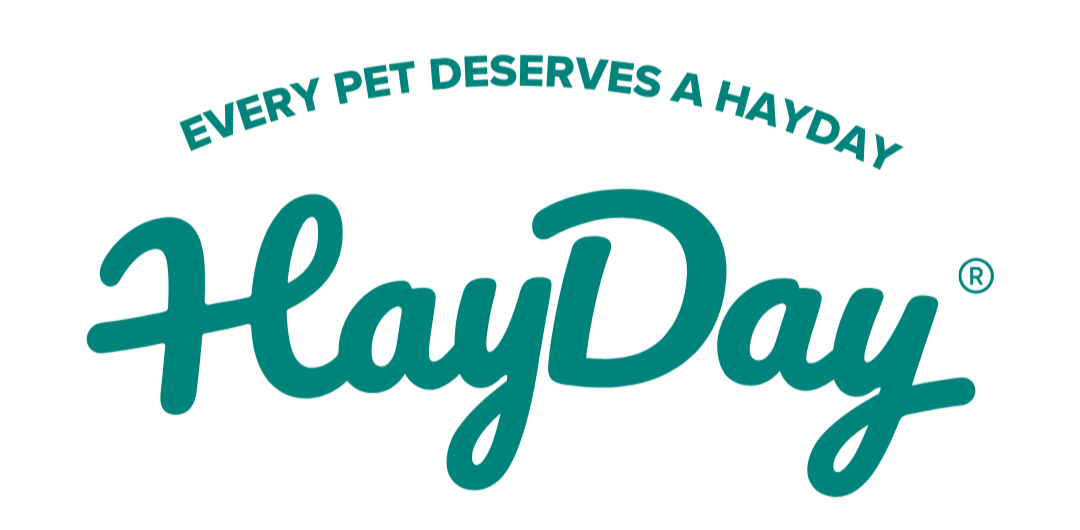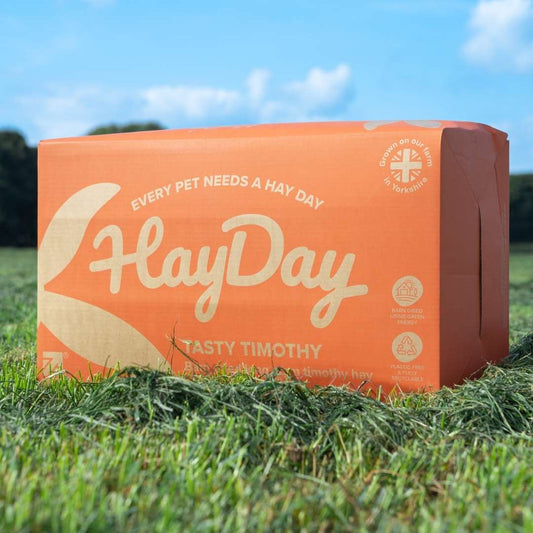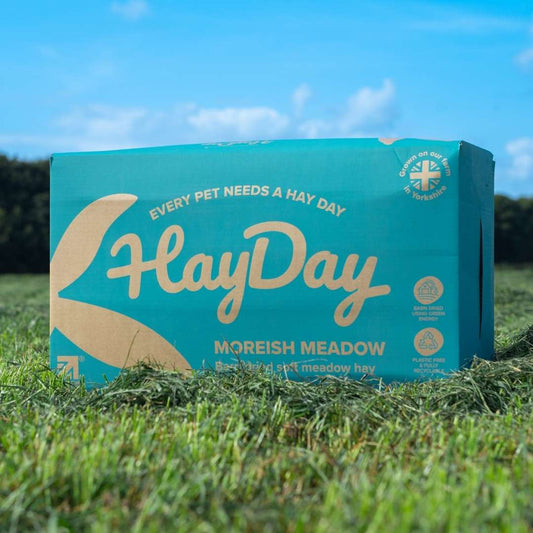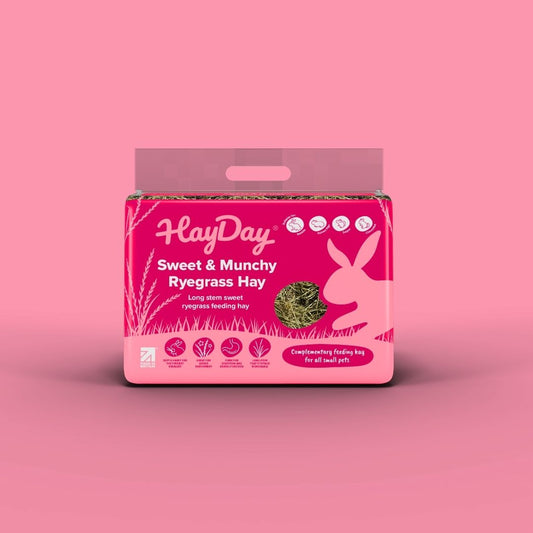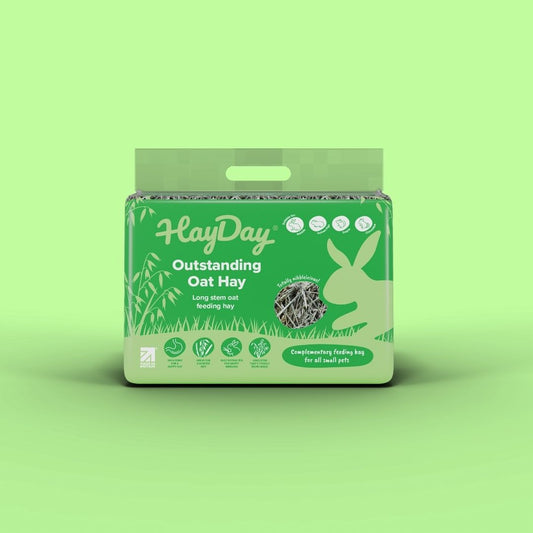Can rabbits eat rocket?
Absolutely, but balance is key. Rocket or arugula (to give it its more formal name) is known for its nutrients and can form a part of your rabbit’s varied diet (Miller, 2022).
If you are new to owning a pet rabbit or just thinking about introducing something new to your furry friend's diet, then let the hay experts at Hay Day explain a little more.
On top of a constant supply of premium barn-dried Timothy Hay or Meadow Hay, the rocket is more than an acceptable treat for buns.
So, read on to learn the benefits and precautions of giving rocket leaves to keep your bunny hopping happily.
Shop Now > Premium, barn dried hay for rabbits.
Feeding Rabbits Rocket Overview
-
Rabbits can eat rocket as part of a balanced diet but only in moderation, once a week, to avoid health issues (Miller, 2022).
-
A healthy rabbit diet primarily consists of premium quality hay, water, fresh vegetables and nuggets with controlled portions of treats, ensuring a range of nutrients without overfeeding.
-
When introducing new foods to a rabbit’s diet, it’s essential to do so gradually to monitor any health issues that may arise, with a variety of safe veggies recommended in our guide for nutritional balance.
Can Rabbits Eat Rocket?
As bunny parents, we all want to ensure our companions get the best nutrition.
The answer is yes, but with caution. While rocket can be part of your rabbit’s diet, it should only be given in moderation, ideally no more than two to three times a week.
Let’s learn more about the nutritional benefits of rocket for your rabbit and the precautions you need to take.
Nutritional benefits of rocket for rabbits
Rocket is a nutrient-rich leafy green that, when included in your rabbit’s diet, can offer a range of health benefits. This veggie is packed with essential vitamins such as vitamins A, C, and K.
These vitamins play a vital role in maintaining your rabbit’s overall health, contributing everything from boosting their immune system to supporting bone health (Mateos et al., 2010).
Another important component of rocket is calcium. Calcium is key for maintaining strong bones in rabbits and to support growth and development (Mateos et al., 2010).
So, not only does rocket add a flavourful twist to your rabbit’s eating times, but it also provides essential nutrients that contribute to their well-being.
Potential risks and precautions
While rocket has its benefits, it’s important to remember that moderation is key. Feeding your rabbit excessive rocket can cause their blood calcium levels to rise, posing a health risk (Miller, 2022; Mateos et al., 2010).
Remember, a rabbit’s diet should be well-balanced and varied (i.e. offering different varieties of hay) to ensure they’re getting all the essential nutrients that they need.
Another point to consider is rocket’s potential impact on your rabbit’s digestive system. Although generally low in oxalate, if the rocket isn’t balanced with sufficient hay to increase fibre intake, it can cause digestive problems (Miller, 2022).
Building a Balanced Diet for Your Rabbit
We’ve established that rocket can be part of your rabbit’s diet, but what does a balanced diet for your bunny look like?
A rabbit’s diet should have a foundation of barn dried premium hay supplemented with fresh vegetables (leafy greens), rabbit specific nuggets and controlled portions of treats (such as fruits) (Miller, 2022).
This ensures they get a good mix of necessary nutrients while avoiding overfeeding, which can lead to significant health issues such as obesity, dental problems and digestive issues.
Top Quality Hay: The essential foundation
This is where we come in. Premium quality hay should form the bulk of your rabbit’s diet. Timothy Hay is one of the most popular feeding hays along with Meadow Hay. They are rich in the essential fibre that rabbits, guinea pigs, chinchillas and degus need for a healthy digestive system.
Providing your rabbit with unlimited quantities of fresh, barn dried hay is essential for their wellbeing - underscoring the importance of the hay’s quality, taste and texture. If your rabbit struggles to eat the recommended quantity of hay per day (at least the size of their body) - try presenting their hays in fun ways such as:
-
Hay racks and feeders
-
Homemade enrichment (empty toilet roll and egg boxes)
-
Scatter feeding which encourages movement around their homes whilst having the pleasure of nibbling away too!
Other hay recommended for rabbits is long stem Ryegrass Hay for a sweet treat or coarse Alfalfa Hay for young (up to 6 months), growing and nursing rabbits. Introducing different hay types to your rabbits diet can also play a key factor in maintaining a healthy and balanced diet.
But the benefits of hay go beyond taste! With the action of continuously chewing hay, rabbits naturally keep their teeth from overgrowing, promoting their dental health.
And if you have a garden, consider creating a rabbit safe and predator proof grassy lawn area to provide your rabbits with access to fresh and suitable grass. But remember, don't feed your rabbit grass clipping/lawn mowings as these will begin to ferment before your rabbit can consume them making it an unsafe feed (Mateos et al., 2010).
Fresh vegetables and leafy greens
Fresh vegetables play a crucial role in a rabbit’s diet, making up about 5-10% of their daily intake (Miller, 2022).
Leafy greens should form the majority of this portion, contributing to a well-rounded and nutritious diet. There’s a wide variety of vegetables that are safe for rabbits, including:
Similarly, non-leafy vegetables that can be included in your rabbit’s diet are:
-
Asparagus
-
Broccoli
-
Cauliflower
Remember it’s important to ensure, before consumption, that these leafy greens, including cauliflower leaves, pear leaves, radish greens, and willow leaves, are safe and non-toxic for your rabbit.
Always wash them thoroughly before feeding to remove any trace of pesticides or harmful chemicals.
Rabbit Pellets
Even though rabbit pellets are designed specifically for rabbits, they should not form the main component of their diet. Ideally, rabbits should have no more than an egg-cup full of rabbit pellets per day.
Foods to Avoid in a Rabbit's Diet
Just as it’s important to know what foods are safe for your rabbit, it’s equally crucial to be aware of the foods that can harm them. Some foods that can harm rabbits include:
-
Chocolate, which contains stimulants that rabbits cannot metabolise, leading to serious health complications
- Onions are also harmful to rabbits and should be avoided at all times
-
Iceberg lettuce, which can cause digestive issues in rabbits
It’s important to avoid feeding these foods to your rabbit for their health and wellbeing.
Introducing New Foods to Your Rabbit's Diet
When introducing new foods to your rabbit’s diet, it’s important to do so gradually. This allows you to monitor any potential stomach upsets or digestive problems that may arise.
Start by feeding a small amount of the new food with their current food, then over a period of 7 to 14 days, gradually increase the new food to acceptable levels.
Keep a close eye on your rabbit during this transition and watch for signs of digestive problems such as diarrhoea, bloating, or lack of appetite. If you notice any issues, slow down the introduction of new foods and contact a vet or nutritionist immediately.
Remember, every rabbit is unique and what works for one might not work for another, even in small quantities.
Summary
In conclusion, providing a balanced and nutritious diet for your bunny is crucial for their health and well-being.
Rocket, along with other fresh vegetables and leafy greens, can be part of your rabbit’s diet, providing essential nutrients.
However, moderation is key to prevent potential health issues. Always remember to introduce new foods gradually and monitor your rabbit for any signs of discomfort or digestive problems.
By educating yourself about your rabbit’s dietary needs, you can ensure they live a long, hoppy, and healthy life.
References
Mateos, G.G. et al.,(2010) Pet Rabbit Feeding and Nutrition. In: deBlas, C and Wiseman, J (Eds.), Nutrition of the Rabbit. Oxford Cab International, 294-313.
Miller, C. (2022) Small mammal herbivores, part 2: nutrition for wellness. The Veterinary Nurse, 13 (8): 368- 376
Frequently Asked Questions
Are there any differences in the diets of wild and domesticated rabbits?
Wild rabbits will have a varied diet - mainly consisting of grass. As there aren't many essential nutrients in grass, this means that wild rabbits have to eat a lot of it! For domesticated rabbits, this is harder to replicate. Therefore, this is why they need unlimited access to hay (high fibre) and a specialised rabbit foods (i.e. nuggets and leafy greens) for a more balanced nutrient intake.
